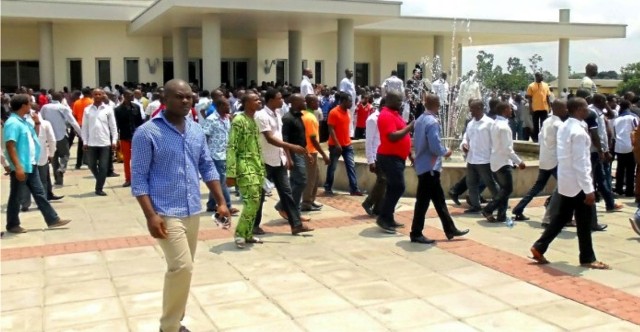Niger Delta
Minister Wants S’Court To Fast-Track ALSCON’s Case

Minister of Mines and Steel Development, Dr Kayode Fayemi, has appealed to the Supreme Court to expedite action on the case involving the Aluminum Smelter Company of Nigeria (ALSCON), to free it from any encumbrances.
Fayemi, made the appeal during an inspection tour of ALSCON at Ikot-Abasi, Akwa-Ibom, lastWednesday.
He said it became necessary for the court to expedite its decision on the company, as it could provide massive investment, employment generation and also bridge importation gap of metals.
The Supreme Court had ruled against RUSAL company which bought the ALSCON from the Bureau of Public Enterprises (BPE) in 2004.
RUSAL and BFIG submitted bids for ALSCON in 2004 when the company was privatised, BFIG won the bidding but failed to meet the stipulated deadline for the payment of the mandatory 10 per cent of the total bid offer.
The Bureau of Public Enterprises (BPE) revoked the offer from the BFIG and gave it to RUSAL because it was able to pay the 10 per cent bid offer, but the BFIG headed to the court and the case was in its favour.
However, the RUSAL company also filed a counter case at a London Arbitration Court after losing the matter in Nigeria.
The Minister said that contrary to reports that RUSAL was involved in asset stripping, the fact on ground showed that the Russian group had maintained the plants as well as a small work force since it stopped work.
“We cannot interfere in legal matters but to encourage the court to expedite action on the issue, particularly on the synergy between the London Court of arbitration and the Nigeria Supreme Court,” he said.
He, however, said that government was fully prepared to tackle other administrative issues that might have crippled production processes at the plant once the legal aspect had been resolved.
Specifically, he said the ministry was ready to assist the company in resolving all administrative issues it might have with some organisations, including the Nigeria Export Processing Authority (NEPZA).
According to him, in spite of the company not functioning for years, it is still maintaining the plant with 140 Nigerian staff and seven expatriates.
He noted that, the company had almost 200 mega watts excess power supply that could be channeled into the national grid.
“Currently, the company has 540 mega watts power but consuming only 360 mega watts, while the remaining power is not being utilised,” he said.
He promised to speak with the minister of power to give access to the company to channel the power into the national grid.
Mr Dmitriy Zaviyalov, Managing Director of RUSAL, urged the government to intervene, to enable the company to commence operation, adding that, it was spending 400,000 dollars monthly.
He also said that the company, in collaboration with Akwa Obom Government, would dredge the harbour close to the company to the Onne sea, to bring materials needed for its production.
Niger Delta
NPC Unveils Digital Registration System In Delta

Niger Delta
Police Uncover Suspects’ Armoury … Recover Weapons In Delta

Niger Delta
Police Caution On Lawless Protests On Court Matters In A’Ibom

-
Maritime1 day ago
Customs Declares War Against Narcotics Baron At Idiroko Border
-
Maritime1 day ago
Nigeria To Pilot Regional Fishing Vessels Register In Gulf Of Guinea —Oyetola
-

 Sports1 day ago
Sports1 day agoGombe-Gara Rejects Chelle $130,000 monthly salary
-
Maritime1 day ago
NIMASA,NAF Boost Unmanned Aerial Surveillance For Maritime Security
-
Maritime1 day ago
NIWA Collaborates ICPC TO Strengthen Integrity, Revenue
-

 Sports1 day ago
Sports1 day agoTEAM RIVERS SET TO WIN 4×400 ” MORROW” …Wins Triple jump Silver
-

 Sports1 day ago
Sports1 day agoNSC eyes international hosting rights
-
City Crime1 day ago
NCSU Hails Fubara Over 2025 New Telegraph Man Of The Year Award

